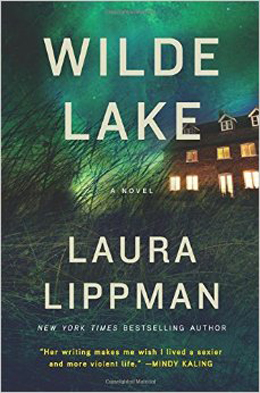When I interviewed Laura Lippman last year, she had this to say about her next book: “I’m writing a crazy-ambitious stand-alone, a crime novel that asks readers to rethink an American classic.” With or without that in mind, astute readers will certainly see the echoes of Harper Lee’s To Kill a Mockingbird as they reverberate through Wilde Lake. However, make no mistake about it, this novel is no imitation. Laura Lippman has merely used that classic as a springboard for this new work that is as much an homage as it is a ground-breaking masterwork all its own.
Wilde Lake is the story of Luisa Brant. Lu has followed her father’s footsteps and become the state’s attorney for Howard County, Maryland – except in Lu’s case, she is the first female to serve in that role. As the novel begins, she is presented with a career-defining case, but when these current events remind her of something that happened within her family in 1980, new revelations from history cause her faith in the legal system to be shaken to the core.
Memory has long been a prevailing theme in the works of Laura Lippman and Wilde Lake is no different. Lippman understands the flawed nature of the mind when looking back over time and manages to employ this shortcoming to full effect within her complex narrative. With this new novel she also begins to examine the judgments we impose on the past when viewed through our modern eyes. Lu comments: “I was at that age where so much begins making sense, where stray facts and memories lingered in some waiting room of the brain until context came and took them by the hand.” (pg. 127) The powerful revelations that result from this discovery are sure to re-appear in one form or another in Lippman’s future novels.
It takes guts to tell a tale involving race relations in the Baltimore Metro area while the city is suffering through a time of strife, but Laura Lippman has never been one to shy away from a challenge. By examining a historical case of racial tensions in the area, she is able to address the current situation without offending or alienating her audience. Laura Lippman weaves this concept into the story with such subtly and finesse that readers never feel preached to or judged. There are no easy answers, but the more informed everyone is, the better off everyone will be.
“The one thing people are never indifferent to are differences. We may not mind them, we may glory in them, but we notice, don’t we? And we congratulate ourselves on our tolerance and open-mindedness. But we are never indifferent.” (pg. 176)
As is always the case with Laura Lippman, location plays an important role in Wilde Lake. The novel is set mainly in Columbia, Maryland – a suburb of Baltimore – which has a very unique history. Relatively new, it was conceived as a planned community, and somewhat of a hippie commune, in the late 1960s, but many of its original ideas (and ideals) failed to thrive. Lippman uses Columbia as a microcosm of the general population allowing her to highlight larger societal ills on a very specific local level.
In the same way that To Kill a Mockingbird is essentially a crime novel, Wilde Lake is likely to reach readers who might not normally shop the mystery aisles of the bookstore. There is a universality to Laura Lippman’s work which seems to have reach a pinnacle here in Wilde Lake. Many readers will consider this her best novel, but what it undoubtedly does is raise the bar for all her novels to follow.
Local Maryland Folks: Don’t forget that Laura Lippman will host her Wilde Lake book launch at The Ivy Bookshop on Thursday, May 5th at 7pm. A book tour will follow for other areas.
______________________________________________________________________
Disclaimer: A print and e-book version of this title was provided to BOLO Books by the publisher. No review was promised and the above is an unbiased review of the novel.


See you and Laura L. at the Ivy!!
Looking forward to it Marcia.